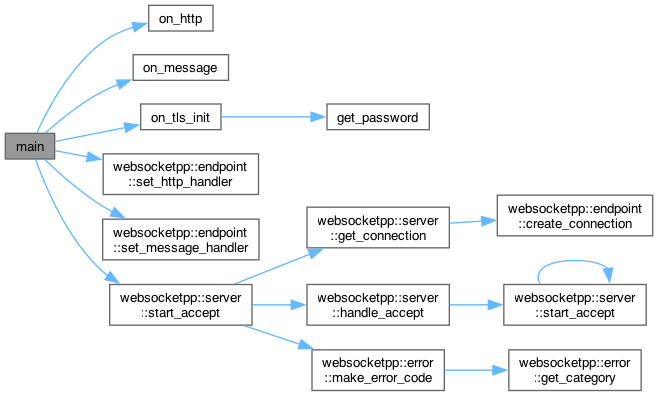
Go to the source code of this file.
Typedefs | |
| typedef websocketpp::server< websocketpp::config::asio_tls > | server |
| typedef websocketpp::config::asio::message_type::ptr | message_ptr |
| typedef websocketpp::lib::shared_ptr< websocketpp::lib::asio::ssl::context > | context_ptr |
Enumerations | |
| enum | tls_mode { MOZILLA_INTERMEDIATE = 1 , MOZILLA_MODERN = 2 } |
Functions | |
| void | on_message (server *s, websocketpp::connection_hdl hdl, message_ptr msg) |
| void | on_http (server *s, websocketpp::connection_hdl hdl) |
| std::string | get_password () |
| context_ptr | on_tls_init (tls_mode mode, websocketpp::connection_hdl hdl) |
| int | main () |
Typedef Documentation
◆ context_ptr
| typedef websocketpp::lib::shared_ptr<websocketpp::lib::asio::ssl::context> context_ptr |
Definition at line 51 of file echo_server_tls.cpp.
◆ message_ptr
Definition at line 50 of file echo_server_tls.cpp.
◆ server
NOTES
This example uses a number of standard classes through the websocketpp::lib namespace. This is to allow easy switching between Boost, the C++11 STL, and the standalone Asio library. Your program need not use these namespaces if you do not need this sort of flexibility.
Definition at line 43 of file echo_server_tls.cpp.
Enumeration Type Documentation
◆ tls_mode
| enum tls_mode |
| Enumerator | |
|---|---|
| MOZILLA_INTERMEDIATE | |
| MOZILLA_MODERN | |
Definition at line 79 of file echo_server_tls.cpp.
Function Documentation
◆ get_password()
| std::string get_password | ( | ) |
Definition at line 73 of file echo_server_tls.cpp.

◆ main()
| int main | ( | void | ) |
Definition at line 133 of file echo_server_tls.cpp.

◆ on_http()
| void on_http | ( | server * | s, |
| websocketpp::connection_hdl | hdl ) |
Definition at line 66 of file echo_server_tls.cpp.

◆ on_message()
| void on_message | ( | server * | s, |
| websocketpp::connection_hdl | hdl, | ||
| message_ptr | msg ) |
Definition at line 53 of file echo_server_tls.cpp.

◆ on_tls_init()
| context_ptr on_tls_init | ( | tls_mode | mode, |
| websocketpp::connection_hdl | hdl ) |
Definition at line 84 of file echo_server_tls.cpp.

